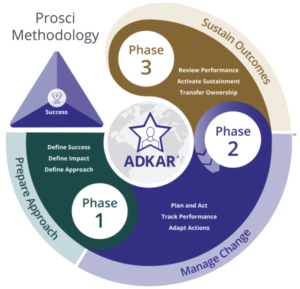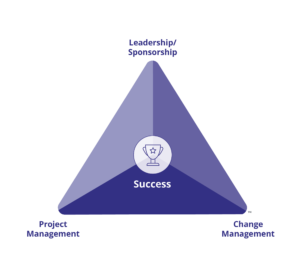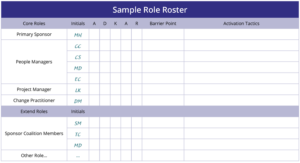The enhanced Prosci Methodology has arrived! As a trusted partner to people and organizations around the world, Prosci continually searches for better ways to manage the people side of change and keep you on the forefront of the discipline. We’re casting a new light on the practice of change management—through innovation, research, and critical practitioner insights—with seven key enhancements to the Prosci Methodology.
PROSCI METHODOLOGY AND ENHANCEMENTS

The Prosci Methodology comprises three main components:
- The Prosci Change Triangle (PCT) Model – a simple but powerful framework for establishing and connecting the most important aspects of any successful change effort.
- The Prosci ADKAR Model – a highly effective model for guiding individuals through the experiences or elements needed to make the change.
- The Prosci 3-Phase Process – a structured, flexible framework for driving change at the organizational level.
The enhanced Prosci Methodology will elevate your change success by making it easier to apply change management to your projects and initiatives. The seven key enhancements in 2021 also address important issues practitioners have shared with us while updating the overall approach in numerous ways:
1. Refreshed the Prosci Methodology and Prosci 3-Phase Process to make them more accessible, actionable, and effective.
Making our change management methodology more accessible was critical to meeting the needs of people with different learning styles or disabilities, and reflecting the diversity of our global community. The result also reduces paper waste while streamlining the process and tools. For example, we now share our research and some books digitally rather than in hard copy.
The more actionable and effective Prosci Methodology and Prosci 3-Phase Process offer a more intuitive structure at a glance, as well as simpler language that makes change management easier to understand. The reorganized structure of the Prosci 3-Phase Process—Prosci’s organizational change management process—is clearer, adaptive by design, and includes new activities to support a broader range of project management approaches, including sequential, iterative and hybrid project lifecycles.
Our training programs for individuals and organizations are enhanced too. For greater effectiveness, we designed more in-program activities to address real-world challenges and added Ability-focused learning outcomes. We even integrated hands-on practice by incorporating a new application tool called Proxima and an online Hub Solution Suite into the Change Management Certification Program.
2. Enhanced the Prosci Change Triangle (PCT) Model and PCT Assessment by adding an assessment of success.
In addition to reverting to the original name—Prosci Change Triangle Model—the clearer and more intuitive PCT Model now puts success at the center of your approach. We added ten factors to the PCT Assessment to enable you to measure the extent to which your organization has established a clear and commonly held definition of change success.
3. Emphasized change success by defining, measuring, and tracking change performance.
The enhanced Prosci Methodology now enables change success by introducing a consistent definition of success for project objectives and organizational benefits, and a new way to document it through the 4P’s (Project, Purpose, Particulars and People). Practitioners also have a way to assess the strength using the new “Success” aspect of the PCT Assessment.
Measuring change performance—the “when” and “how” of change management—is easier than ever with a new roadmap for aligning people-side activities and timelines with the project lifecycle and a tracking calendar. Useful for tracking performance with the PCT Assessment, ADKAR Assessment, and Progress to Plan, the roadmap leverages the Prosci Change Scorecard framework to address three areas of performance: organizational, individual and change management.
4. Strengthened the Prosci Risk Assessment and analysis, and provided guidance to address risk factors.
The updated Risk Assessment acknowledges a broader range of risk by increasing the number of factors for each assessment. We also made scoring easier with clear descriptions and guidance, and accessible terminology.
Prosci now provides two levels of risk grid customization guidelines to help practitioners take appropriate actions based on the risk assessment results:
- Risk Assessment Analysis – provides general guidance for customization based on risk quadrant, including implications for the ADKAR Model, Role Roster, and change management plans based on the risk profile for a change.
- Risk Factor Analysis and Activities – offers specific customization guidance, including potential activities to mitigate risk. This guidance is based on addressing the change characteristics and organizational attributes risk factors that represent the greatest threats to implementing a successful change.
5. Added a Role Roster to make it easier to identify and activate change management roles.
The new Role Roster enables you to identify core roles required for successful organizational change and help the individuals in those roles fulfill their responsibilities as sponsors, people managers, project managers and front-line employees impacted by change. The ADKAR Model is also applied to support role assessment and fulfilment, including the sponsor role.
6. Introduced the ADKAR Blueprint as a foundation for change management plans.
Phase 2 – Manage Change (within the Prosci 3-Phase Process) now begins by orienting around the ADKAR Model as a starting point. Leveraging the simple and scalable ADKAR Blueprint enables you to identify high-level milestone dates, expected gaps, and initial ideas for each of the ADKAR elements.
The ADKAR Blueprint is a game-changer that will make change management significantly easier! Many novice change practitioners struggle to know which plan they should focus on developing first. To address this issue, Prosci developed the ADKAR Blueprint as an easy-to-understand, easy-to-use starting point for planning and applying change management. Under some circumstances, such with a small change or novice practitioner, the ADKAR Blueprint might be the only plan you need. For larger or more complex changes, the ADKAR Blueprint informs the creation of specific plans and deliverables to support your project execution.
7. Increased flexibility in the number, depth, and type of change management plans.
Instead of always prescribing five plans, the refreshed Prosci Methodology guides you to choose the number, type and depth of change management plans needed to deliver successful ADKAR outcomes in your unique organization or for your unique change.
As mentioned above, the simple but powerful ADKAR Blueprint may be the only plan you need in certain cases. However, most of the time, you will select from role-based and activity-based Core Plans—Sponsor Plan, People Manager Plan, Communications Plan and Training Plan—to meet your unique project’s requirements. You may also add Extend Plans, such as the Resistance Management Plan, Change Agent Network Plan, Sustainment Plan, and others. Note that we renamed some plans to make them more consistent with role names and to align with our people-focused language.
WE LISTENED. WE LEARNED. WE ADAPTED.
The enhanced Prosci Methodology is better than ever and is still based on the largest body of knowledge on change management in the world. More than two decades of research continue to inform the ADKAR Model, ABCs of Sponsorship, and CLARC Roles of People Managers. The value proposition of change management remains steadfast and true: We capture the people-dependent portion of project ROI by driving adoption and usage. And Prosci will always be committed to creating unforgettable experiences that equip people to achieve more successful change.
What you already know about people, change and results aren’t changing. How you activate it is improving.
If you want to know more now, do not hesitate to contact us.



